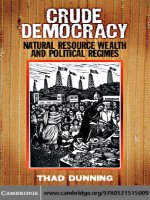- Trang chủ >>
- Khoa Học Tự Nhiên >>
- Vật lý
how terrorism is wrong morality and political violence may 2008
Bạn đang xem bản rút gọn của tài liệu. Xem và tải ngay bản đầy đủ của tài liệu tại đây (1.33 MB, 216 trang )
HOW
TERRORISM
IS
WRONG
This page intentionally left blank
HOW
TERRORISM
IS
WRONG
Morality and Political Violence
Virginia Held
1
2008
Oxford University Press, Inc., publishes works that further
Oxford University’s objective of excellence
in research, scholarship, and education.
Oxford New York
Auckland Cape Town Dar es Salaam Hong Kong Karachi
Kuala Lumpur Madrid Melbourne Mexico City Nairobi
New Delhi Shanghai Taipei Toronto
With offi ces in
Argentina Austria Brazil Chile Czech Republic France Greece
Guatemala Hungary Italy Japan Poland Portugal Singapore
South Korea Switzerland Thailand Turkey Ukraine Vietnam
Copyright © 2008 by Oxford University Press, Inc.
Published by Oxford University Press, Inc.
198 Madison Avenue, New York, New York 10016
www.oup.com
Oxford is a registered trademark of Oxford University Press
All rights reserved. No part of this publication may be reproduced,
stored in a retrieval system, or transmitted, in any form or by any means,
electronic, mechanical, photocopying, recording, or otherwise,
without the prior permission of Oxford University Press.
Library of Congress Cataloging-in-Publication Data
Held, Virginia.
How terrorism is wrong : morality and political violence / Virginia Held.
p. cm.
Includes bibliographical references and index.
ISBN 978-0-19-532959-9
1. Terrorism—Moral and ethical aspects. 2. Political violence. I. Title.
HV6431.H417 2008
172'.1—dc22 2007033845
135798642
Printed in the United States of America
on acid-free paper
3
preface
I gratefully acknowledge permissions to reprint in this book parts or all
of works that have previously appeared. These include “Terrorism and
War,” Journal of Ethics 8 (2004): 59–75; “Legitimate Authority in Non-
state Groups Using Violence,” Journal of Social Philosophy 36(2) (Summer
2005): 175–193; “Terrorism, Rights, and Political Goals,” in Violence, Ter-
rorism, and Justice, ed. R. G. Frey and Christopher W. Morris (New York:
Cambridge University Press, 1991); “Group Responsibility for Ethnic
Confl ict,” Journal of Ethics 6 (2002): 159–181; “The Media and Political
Violence,” Journal of Ethics 1 (1997): 187–202; “Violence, Terrorism, and
Moral Inquiry,” Monist 67(4) (1984): 605–626, used in chapter 7; and
“The Normative Import of Action,” in Gewirth: Critical Essays on Action,
Rationality, and Community, ed. Michael Boylan (Lanham, Md.: Rowman
and Littlefi eld, 1999), used in chapter 8.
I am indebted to the anonymous readers at Oxford University Press for
their helpful suggestions for the proposed book. I also wish to thank Peter
Ohlin of Oxford University Press for his advice and encouragement.
Nearly all of the material in the book has been presented in earlier
forms to various groups, and I am deeply grateful to all who gave me
the benefi t of their thoughts and reactions. Though I omit many names,
I wish to single out a few of them for special mention.
The paper that became chapter 1, “Terrorism and War,” started out as
a talk on terrorism given at a session of the American Philosophical Asso-
ciation, Pacifi c Division, meeting in Seattle on March 30, 2002. It then
became a paper called “Kinds of Terrorism,” which I presented at the Cen-
tral Division of the American Philosophical Association meeting in Chicago
on April 25, 2002. It was then further developed into papers presented at
a conference called “Moral and Political Aspects of Terrorism,” held at the
University of Arizona March 7–9, 2003; at the Conference on Value Inquiry
at the University of North Dakota April 10–12, 2003; and at the annual con-
ference of the North American Society for Social Philosophy in Boston on
July 19, 2003. At these sessions I received many helpful comments on these
earlier versions of the chapter. I would like to thank the organizers and
participants at these conferences, as well as those who provided additional
remarks, especially Sigal Ben-Porath, Susan Brison, Ed Byrne, Thomas
Christiano, C. A. J. Coady, Ted Honderich, Alison Jaggar, William McBride,
Angelia Means, Stephen Nathanson, Andrew Valls, and Jeremy Waldron.
Chapter 2, “Military Intervention and Terrorism,” has not been pre-
viously published. It began as a talk on principled differences in the
grounds for military intervention, given at a special session of the Ameri-
can Philosophical Association, Pacifi c Division, in Portland, Oregon, on
March 23, 2006. I appreciate the efforts of Deen Chatterjee and Don
Schied in organizing that session and the observations of the other panel
members, especially Larry May. Papers that developed my thoughts on
intervention were then given at Wellesley College and Hampshire Col-
lege, and I thank those who arranged these talks and commented on
them, especially Lester Mazor and Laura Reed. A paper that resembles
this chapter was presented at a session of the Legal Theory Workshop at
Yale University on February 1, 2007; I am enormously grateful to Judith
Resnick for her comments on this occasion and later on and to the other
participants in the discussion, especially Seyla Benhabib, Michael Doyle,
Bruce Ackerman, Jules Coleman, and Joel Marks. Arguments in the
chapter were further discussed at a conference at Denison University on
February 22–23, 2007, where I benefi ted from remarks by Alison Jaggar
and Fiona Robinson, then at an ethics conference at Felician College on
March 17, 2007; I thank Yvonne Raley, Lisa Cassidy, and Chris Alen Sula
for their contributions to this occasion.
An earlier version of chapter 3, “Legitimate Authority in Nonstate
Groups Using Violence,” was presented at a meeting of the American
Philosophical Association’s Pacifi c Division in Pasadena, March 26, 2004,
and discussed at a colloquium at the CUNY Graduate Center, December
14, 2004. I am grateful to those who arranged these discussions and
to all who commented then and later, especially Omar Dahbour, Carol
Gould, Karen Kovach, John Lango, Lionel McPherson, Richard Miller,
and Luis Rodríguez-Abascal.
vi • p r e f a c e
I extend my appreciation to the many persons who made helpful
comments when chapter 4, “Terrorism, Rights, and Political Goals (with
Postscript),” was presented in preliminary forms at a philosophy depart-
ment program at the graduate school of the City University of New York;
at a conference of the Greater Philadelphia Philosophy Consortium; at
a conference on violence, terrorism, and justice at Bowling Green State
University; at a conference on law and the legitimization of violence at
the University of Buffalo; and at presentations at Colgate University and
Hampshire College. Special thanks go to Annette Baier, C. A. J. Coady,
Jonathan Glover, Bart Gruzalski, Lionel McPherson, Hans Oberdiek,
Joseph Raz, Peter Simpson, and Huntington Terrell. I am indebted to
Igor Primoratz for including it in his collection on terrorism and for
inviting the postscript that responded to a critique.
An earlier version of chapter 5, “Group Responsibility for Ethnic Con-
fl ict,” was presented at a conference titled “Violence, Responsibility, and
Reconciliation,” sponsored by the Center for Philosophic Exchange and
held at Santa Barbara City College, October 9–11, 1998. I wish to thank
Aleksandar Jokić for having organized this conference and those partici-
pants who commented on the presentation. Later versions were given at
philosophy colloquia at the College of William and Mary on November
12, 1999, and the Graduate Center of the City University of New York
on September 5, 2001. My thanks go to those on these occasions who
offered their views, especially Larry Becker, Mark Fowler, Alan Fuchs,
and Paul Grieco, as well as to Ariel Colonomos, Karen Kovach, and Philip
Pettit for additional suggestions.
I am grateful to Angelo Corlett for his thoughts on the paper that
has become chapter 6, “The Media and Political Violence,” and to John
Hospers and Anita Silvers for the special issue of the Monist in which
a paper titled “Violence, Terrorism, and Moral Inquiry,” which forms
part of chapter 7, originally appeared. I also thank Michael Boylan for
organizing the conference on Alan Gewirth at which a paper, “The Nor-
mative Import of Action,” which I have incorporated into chapter 8, was
originally given, and I express my appreciation to those who commented
on it.
I have approached many of the issues in this book with trepidation
and even more uncertainty than I felt when addressing other philosophi-
cal issues. The most I hope for is that the book will contribute to a badly
needed discussion, and I thank all those who join in this task.
preface • vii
This page intentionally left blank
contents
Introduction
[3]
Chapter 1
Terrorism and War
[13]
Chapter 2
Military Intervention and Terrorism
[29]
Chapter 3
Legitimate Authority in Nonstate Groups Using Violence
[52]
Chapter 4
Terrorism, Rights, and Political Goals
(With Postscript)
[71]
Chapter 5
Group Responsibility for Ethnic Confl ict
[91]
Chapter 6
The Media and Political Violence
[110]
Chapter 7
The Moral Assessment of Violence and Terrorism
[126]
Chapter 8
Moral Inquiry, Action, and Care
[144]
Notes
[165]
Bibliography
[183]
Index
[199]
x • contents
HOW
TERRORISM
IS
WRONG
This page intentionally left blank
Introduction
What questions should we ask about political violence? We are often
in doubt. This book offers moral assessments of some forms of politi-
cal violence. It focuses on terrorism as the most salient, current form
in need of examination, analysis, and evaluation. It discusses various
moral and other arguments about violent confl ict and endeavors to
steer future efforts of theorizing and practice in justifi able directions
that will diminish the grievous suffering caused by violence and ter-
ror. The book considers conditions that promote political violence and
evaluates efforts to deal with violence and with such conditions. Among
the questions considered are: What makes a course of action aimed
at bringing about or preventing political change morally acceptable?
How, on what basis, and according to whom should political violence
be evaluated?
The book compares terrorism with other kinds of violence, such as
war or the maintenance and enforcement of a political and legal order
that often kill far more people, including children, than do terrorist
acts. It scrutinizes popular attitudes that glorify some kinds of violence
and vilify others. It moves beyond the widespread but distorted picture
of mystifyingly unexpected terrorist attacks that arise from nowhere, as
well as of appropriate (or inappropriate) responses, and considers such
events in the wider contexts of various regional and global confl icts. It
looks at earlier political violence to achieve social change.
Philosophical and other academic discussions of terrorism have often
been quite different from the reportage in much of the popular press
and the statements of many commentators and politicians positioning
4 • how terrorism is wrong
themselves for advantage. Philosophers have for the most part treated the
use of terrorism (and of violence to suppress it) as a topic to subject to
moral analysis and critique. Political scientists have sought to understand
and explain the causes of terrorism and to assess effective countermea-
sures. Psychologists have tried to understand the personal component of
individual terrorists’ violent acts. In political debates and media discus-
sions, in contrast, all too often the assumption is made that terrorism is
the epitome of evil, which suddenly and inexplicably arises to slaughter
the innocent, and that the violence “we” and our friends unleash to fi ght
against it is unquestionably righteous. Often it is even suggested that
those who try to understand terrorism are thereby excusing it and thus
are morally culpable. In the face of such deliberate lack of awareness, this
book presents a philosophical treatment that intends to take appropriate
account of fi ndings in other academic fi elds, reliable reportage in the
press, and responsible public discussion and does not yield to the fear of
taking unpopular positions.
Over the years I have written a number of essays that assess on moral
grounds the use of violence—by individuals with political motives, by
groups seeking political change, and by governments. The book is based
on those analyses. Three of them were written after the attack on the
World Trade Center on September 11, 2001, which led to a huge resur-
gence of interest in terrorism and violence. Readers who believe, as I do
not, that 9/11 changed everything may assume that work written earlier
has automatically been superseded. My own view is that the moral issues
after 9/11 are substantially similar to those that have periodically arisen
surrounding violence and that the earlier essays are as relevant now as
when they were written, though some have been heavily revised.
My views on moral theory have changed more than my beliefs about
violence specifi cally. For issues of violence and ways to deal with it, I am
now more persuaded than when I began these essays of the signifi cance
of the ethics of care.
1
This is illustrated briefl y in chapter 2 in the dis-
cussion of international law and dealt with further in chapter 8, where
I examine characteristic arguments in the ethics of care.
The ethics of care provides a comprehensive moral outlook for the
evaluation of human relations generally. It can serve as a moral guide
in our closest and most distant relations: in the networks that connect
us as members of families and groups, as participants in civil society,
and as aspirants to global civility. Traditional and dominant moral theo-
ries such as Kantian ethics and utilitarianism, with their deontological
Introduction • 5
and consequentialist approaches, are still suitable for many legal and
political issues when these are seen as embedded in a wider network
of human relationships; however, they are less satisfactory than usually
thought when expanded into comprehensive moral theories. Since in
this book I am primarily concerned with violence that arises from politi-
cal confl ict and is dealt with in political and legal ways, the more familiar
approaches often remain appropriate. However, for longer-term evalu-
ations of political institutions and practices, of groups and the violence
they often employ, and of ways to confi gure these domains within wider
societies (including potentially a global one), the ethics of care may be
more promising.
2
In a Kantian or deontological approach to morally evaluating acts of
violence, one considers the principles one deems valid that would yield
judgments about particular actions. The actions are seen to have char-
acteristics that make them wrong or right in themselves, regardless of
their consequences. For instance, it is inherently wrong to lie or deceive,
even if doing so may on occasion have good results. Similarly, acts of
violence can often be judged to violate people’s rights and thus to be
inherently wrong, or they can be acts of law enforcement and thereby
often justifi ed. According to some points of view, the inherent wrongness
or rightness of actions is only prima facie, and other considerations can
sometimes outweigh it, but it is never unimportant.
We can contrast this with a consequentialist approach to morality, of
which utilitarianism is the leading example, in which actions in them-
selves are neither right nor wrong but are to be judged on the basis of
their consequences. From this viewpoint, violence is often considered as
unfortunate but necessary to enable governing or to achieve desirable
political change. Whether the good consequences of violent acts out-
weigh the bad depends on considerations such as what serves people’s
interests or diminishes their suffering. Our evaluations of these factors
usually rest on empirical estimates of them that are often in doubt at the
time of action but that we cannot avoid acting on.
In contrast with both of these approaches, the ethics of care espe-
cially values caring relationships, obviously at the personal level within
families and among friends and less obviously at the most general level
of all human relationships. It understands the importance and necessity
of caring labor and the values of empathy, sensitivity, trust, and response
to need. It cultivates practices such as the building of trust and respond-
ing to actual needs. In contrast to the model of the self-suffi cient liberal
6 • how terrorism is wrong
individual, the ethics of care sees persons as interrelated. It is appropriate
for the wide but shallow human relations of global interactions, as well
as for the strongest and most intimate human relations of care in fami-
lies. Growing out of feminist appreciations for the enormous amount of
overlooked but utterly necessary labor involved in bringing up children
and caring for the ill, it articulates especially the values involved and the
guidance they provide.
The ethics of care has developed care as a value that rivals justice,
and it evaluates practices of care. It is based on experience that is uni-
versal—the experience of having been cared for, since no child can
survive without this—and compares favorably in this regard with con-
tractual views only claimed to be universal. It rests not on divisive reli-
gious views but on common experience. Then, it can conceptualize
that within the more distant and weak relations of care, we can develop
political and legal ways to interact, and here the more familiar moral
theories may be most appropriate. For the adequate moral assessment
of violence and terrorism we need to consider all of these sources of
moral insight.
The ethics of care can provide the grounding for the valuing of non-
violence over violence in regional and global confl icts, a concern that is
relatively missing in the familiar political and moral theories designed
for the interactions of citizens of a given state. The social contract tradi-
tion and the moral theories (e.g., Kantian ethics and utilitarianism) that
have accompanied its development have never dealt adequately with
the question of which individuals or groups are to be included in the
contract. Answers to such questions have merely been assumed. In fact,
violence has played an overwhelming role in establishing the boundaries
and memberships of states. Nationalism and imperialism rather than
contractual agreements have permeated their development and continue
to dominate their situations.
When the principles deemed appropriate for citizens’ relations with
each other are universalized as moral theories (or even as theories of
international relations), they remain abstract and nearly inapplicable to
a world already carved up into thoroughly unequal states, the more pow-
erful of which can exploit and impose their will on others—and have
often done so. A moral theory such as the ethics of care is needed to
ensure that we care enough about our fellow human beings to respect
their rights and take appropriate account of their interests and espe-
cially that we refrain from aggressive violence. The ethics of care advises
Introduction • 7
that we promote our policies and seek change and maintain order as
nonviolently as possible.
At both the state and the international level, the ethics of care does
not ask for justice to be replaced by care, either in its institutions or our
moral theorizing. Within states, for instance, it recognizes the impor-
tance of law and its enforcement in protecting people from violence and
in implementing their rights to equality. It asks that legal institutions be
more caring than they are but maintains that justice, as a value, ought to
have priority over care in the limited domain of justice, although care
may be primary in the comprehensive morality within which law should
guide specifi c interactions. The ethics of care recognizes the gross limi-
tations of law and the superiority of other moral approaches for much
of human value. Analogously at the international level, care can recom-
mend respect for international law while contributing to more promising
alternatives.
Care is obviously antithetical to violence, which damages and destroys
what care takes pains to build. Care instructs us to establish the means to
curb, contain, prevent, and head off the violence that characteristically
leads to more violence. In bringing up children, this requires a long
process of nurturing and education in order to cultivate nonviolent
feelings, self-restraint, appropriate trust, and an understanding of the
better alternatives to aggressive confl ict. In interactions with others at
some distance, the primary institutions with which to prevent and deal
with violence are political and legal, and care can recommend accep-
tance of these institutions when appropriate even as it recognizes their
limits. Moreover, it can suggest alternative ways of interacting that may
prove more satisfactory. These understandings can be matched at the
international level, as care recommends respect for international law
and also recommends alternative methods of fostering interconnection.
We should work to build interactions that are not primarily political and
legal—the often nongovernmental networks of civil society, with their
cultural, economic, educational, environmental, scientifi c, and social
welfare forms of cooperative institution—and that will connect us and
address our problems. We can gradually extend their reach so that we
can better express our caring.
3
It is widely understood within states (though not by every adminis-
tration or offi cial), as well as within practices of care, that those who
enforce reasonable rules should not resort to the same tactics as those
who break them. This point should be much better understood at the
8 • how terrorism is wrong
international level. Moreover, within families and in a global context, to
avoid paternalistic domination, care needs to be interpreted from the
perspective of both the recipient and the provider. Care can be provided
in ways that are domineering, oppressive, insensitive, and ineffective,
but this is not good care. The ethics of care provides guidance for meet-
ing the needs of persons, including requirements for peace and secu-
rity from violence, in ways that are effective, sensitive, liberating, and
responsible.
There are those, of course, who will derisively protest that one can-
not deal with terrorists or violent states in the same ways that parents try
to deal with aggressive children, and certainly advocates of the ethics of
care will agree. The point is rather that the values of care can provide
guidance for both. Sara Ruddick has explored the way in which an ideal
of nonviolence “governs the practice” of maternal care, although actual
mothers are often violent.
4
She shows how relevant such practices are for
those who are working to promote peace. Mothers, she observes, often
“school themselves to renounce violent strategies of control and to resist
the violence of others. . . . [They] strive to create welcoming responses
to bodily life despite the disturbing willfulness” of those for whom they
care. A politics of peace should be “resolutely suspicious of violence even
in the best of causes.” Peacemakers seldom call for an absolute renuncia-
tion of violence, but they “fi x on inventing myriad forms of cooperation,
reconciliation, and nonviolent resistance.”
5
Guided by the ethics of care, we would recognize that violence (or
the threat of it) is an expectable aspect of human reality and that we
can work successfully to contain it and decrease the damage it brings
about. We would restrain rather than destroy those who become violent,
we would work to prevent violence rather than wipe out violent persons,
and we would inhibit violence as nonviolently as possible.
In this book I begin with the post-9/11 essays on terrorism. They consider
appropriate responses and preventive measures in order to further our
understanding of what terrorism is, what its likely causes are, and what
we should do about it. They aim at morally assessing recent instances of
terrorism and the actions, policies, and practices taken and considered
to counter them.
The later chapters ask many of the same questions but focus less on
terrorism. Political violence takes many forms, and considering them
helps us to understand terrorism in the wider context of human confl ict.
Introduction • 9
As I have already emphasized, the book assesses violence from a moral
perspective. Of course, violence is morally problematic, but blanket con-
demnations of a simple kind are of very limited use. I make distinctions
and evaluations that can be helpful to actual human beings who are liv-
ing in violent societies in a brutal world. This discussion, I hope, will
enable us to make more responsible decisions and to take more justifi able
actions in the face of both actual and threatened violence.
The fi rst chapter compares terrorism with war, clarifi es meanings, and
assesses comparative wrongs. It argues that terrorism is not uniquely atro-
cious but is on a continuum with many other forms of political violence,
and it maintains that wars, even “good wars,” are often morally far worse.
It concludes with a suggestion about seeking the causes of terrorism.
The second chapter is previously unpublished. It considers the issues
that surround military intervention as a response to terrorism and explores
the status of international law and the extent to which morality demands
respect for it. It examines the cases of genocide in Rwanda, the NATO
intervention in Kosovo, and the U.S. invasion of Iraq in 2003. It investigates
the idea of retroactive justifi cation and considers its moral implications.
The third chapter considers both the standing of nonstate groups
that use violence and the question of whether they can ever legitimately
engage in justifi able violence. Many people assume they cannot, but lib-
eration movements often aspire to be considered legitimate, and some
have evidently succeeded.
With the fourth chapter I turn to an earlier treatment that I have
recently updated. It considers how an absolutist condemnation of ter-
rorism cannot be derived from a consequentialist evaluation and shows
how it should also not be thought derivable from a deontologically based
respect for human rights.
Chapter 5 was infl uenced by the upheavals and violent ethnic confl ict
in the Balkans in the 1990s. It raises questions about group responsibil-
ity that have long been of interest to me. It concludes that people can
and often ought to take responsibility for the actions of groups of which
they are members.
Chapter 6 considers the role of the media in responsibly dealing with
terrorism. Despite changes occuring in the media since the text was writ-
ten, the pressing issues today seem remarkably similar to those I have
been raising for some time about the structure of media culture.
The fi nal two chapters discuss how I believe we should conduct
moral assessments of political actions. They describe the relevant factors
10 • how terrorism is wrong
and ways in which we can interpret their moral signifi cance. I present
guidelines for conducting moral inquiries and propose ways to improve
our evaluations. Both chapters are substantially revised versions of earlier
essays. The last chapter in particular contains much new material and
discusses the ethics of care.
Since this book is a philosophical treatment of violence and terrorism,
readers can expect it to clarify the meanings of these terms. Terrorism is
notoriously hard to defi ne. The word is routinely used in quite different
and often contradictory ways, depending on one’s interests. Philosophers
have made progress in clarifying its meanings, but no single defi nition
seems satisfactory. I discuss the reasons one can fi nd various defi nitions
unsatisfactory. I cannot propose a simple solution to the problem of defi -
nition, but throughout the book I attempt to improve our understanding
of political violence and its various forms, including terrorism.
This book does not deal with many of the critical issues surrounding
political violence. One such set of questions concerns just war theory.
Since just war theory was devised to deal with the military force used by
armed forces against each other, it is unclear whether and how it should
infl uence the evaluation of such nonmilitary forms of violence as terror-
ism.
6
I assume that the moral imperatives central to the just war tradi-
tion (i.e., that war must have a justifi able purpose; that it must be a last
resort; that, in conducting war, all sides should limit the way they use
violence; and that when they do use violence, it should be proportional
to the objective, thereby minimizing unnecessary casualties) are moral
imperatives worthy of respect, though often indeterminate.
The concerns of just war theory to reduce the wrongs and harms of
violence, even if we cannot eliminate violence from human affairs, are
morally compelling regardless of the type of violence used and the type
of user. Much more needs to be said, however, about the implications of
just war principles. Whether war with contemporary weapons can pos-
sibly be just is a pressing question. Whether those without the means
to engage in military confrontations with opposing states but with the
means to cause substantial harm in other ways should be judged by the
standards of just war theory is questionable, but what moral standards
should be applied? Many of the moral considerations will be similar
in both cases, but they may yield different recommendations from the
familiar ones of just war theory. Since just war theory does not cover the
violence most evident in recent years—that of resistance and liberation
movements, of terrorism and guerrilla campaigns, and of the retaliation
Introduction • 11
against these—even if the theory were satisfactory for states’ use of mili-
tary force against each other, it would be of limited use. New thinking is
badly needed to help us develop evaluations that adequately address the
types of violence currently taking place.
Other issues missing here are the militarization of society and its effect
on the thinking of citizens, governmental policies, and states’ prospects.
Preparations for using violence, as well as actually using it, call for moral
evaluation, but these are not discussed here. Nor do I give more than
passing attention to the relative uselessness of much of the most advanced
weaponry for dealing with many kinds of violence and opposition.
Other questions about which not nearly enough is said involve the
enormous amount of violence perpetrated around the globe against
women. When rape is used as part of a campaign of ethnic cleansing or
as a wartime tactic, it is clearly political. In other cases (to the extent that
violence against particular women is actually directed against women in
general, as it has often been shown to be, and is part of an effort, con-
scious or not, to preserve men’s dominance), it is political in the sense
that any structure of dominance (e.g., patriarchy) has political aspects,
though male dominance goes far beyond the political. Violence against
homosexuals and racial minorities is comparably political, but it is more
as well. Obstruction of the progress that women are making around the
world and intolerance toward gender identities other than that of male
heterosexuals are important components in the rise of religious extrem-
ism, with its dangerous tendencies to encourage violence and confl ict.
The ethics of care can be helpful in its moral recommendations for
dealing with these issues.
7
Another set of questions neglected concerns how people should try
to repair the moral and human damage caused by violence. Important
developments have taken place, including the establishing of interna-
tional tribunals to bring to justice those who are guilty of genocidal actions
and other mass violence. Much has happened to foster reconciliation
and truth commissions as alternatives to trials and punishment. These
are often more expressive of the values of care than their alternatives.
I applaud many of these developments and inquiries but do not take
account of them in this book.
8
Urgent questions about the curtailing of civil rights in political
responses to violence are also not dealt with here. These matters are obvi-
ously political in the sense in which I am using the term, and of great
importance, but they are beyond the bounds of my present effort.
12 • how terrorism is wrong
Much more needs to be said about how morality should guide us in
dealing with violence, including its political forms. The chapters here
suggest various factors and moral considerations that ought to enter into
our evaluations. The issues are unusually fraught with the prospects of
dreadful choices, dire consequences, and terrible failures no matter what
we try to do. Efforts at philosophical understanding may nevertheless be
of some use.
one
Terrorism and War
There are different kinds of war: world wars, small wars, civil wars, revo-
lutions, wars of liberation. There are also guerrilla campaigns, which
may become wars. In discussions of terrorism, it is a serious mistake
to suppose that all terrorism is alike. Terrorism has different forms, as
does war.
In the United States, the Right has been asserting that to hold any-
thing else than that all terrorism is the same is to undermine the “moral
clarity” needed to pursue the war on terrorism. Further, U.S. neocon-
servatives, Christian fundamentalists, and the Israeli Right are especially
intent on arguing that the terrorism carried out by Palestinians is the
same as that conducted by Osama bin Laden and the Al Qaeda network.
1
They agree with former Israeli prime minister Ariel Sharon that “terror-
ism is terrorism is terrorism anywhere in the world.”
2
Asserting that Israel
is battling the same enemy as the United States, Sharon has stated that
“the cultured world is under a cruel attack by radical Islam. It is an enemy
composed of lunatic individuals, lunatic regimes and lunatic countries.”
3
Such views have found a strong echo in the United States after the attacks
of September 11, 2001.
Those who maintain that all terrorism is alike also argue that the
same countermeasures, such as military obliteration and preventive
attack, should be used against all terrorists and that the same principles,
such as “never negotiate with terrorists or with those who support them,”
should be applied. To U.S. Vice President Dick Cheney, with terrorists
“no policy of containment or deterrence will prove effective. The only
14 • how terrorism is wrong
way to deal with this threat is to destroy it, completely and utterly.”
4
Those
who share these views are intent on rejecting any comparisons between
deaths caused by terrorists and deaths caused by their opponents, on
the grounds that there is “no moral equivalence” between terrorism and
fi ghting against terrorism.
It is not only the Right, however, that seeks a simple, all-purpose
moral condemnation of all terrorism. New York Times correspondent
Nicholas Kristof, while acknowledging the diffi culties in seeking “moral
clarity,” has nevertheless advocated it with respect to terrorism.
5
He has
suggested that a moral revulsion against killing civilians could develop
akin to that which developed after World War I and resulted in the dele-
gitimization of the use of poison gas. But this assumes we can clearly dis-
tinguish “civilians” from “legitimate targets,” which is a contested issue.
Voting publics often put into power the governmental leaders—and
support the policies—that terrorists oppose. If other means have failed
and if violence against the members of a state’s armed services is justi-
fi ed, it is unclear why those who bring about that state’s policies and give
its military forces their orders should be exempt from having violence
used against them. At least such an argument could muddy the moral
clarity of the revulsion against terrorism the proponents of such revul-
sion seek.
Furthermore, the occasions for moral revulsion are unlikely to be lim-
ited in the way those who see all terrorism as alike have suggested. Ted
Honderich, for instance, shares the moral revulsion of countless others
at the carnage of September 11.
6
However, he is also outraged by the
fact that the United States promotes global economic policies that make
many millions of people miserable in the world’s poorer countries and
cut their lives short. He sees enough of a connection between such mis-
ery and the appeal of terrorism to its potential recruits that he holds the
United States partly responsible for the terrorism practiced against it.
Moral revulsion can thus be so appropriately multiplied that the unique-
ness of terrorism in provoking it is undermined, and with this goes the
sought-for moral clarity. We seem to be left, then, with needing to make
complex and disputable moral judgments here as everywhere else. This
is not at all to suggest that persuasive judgments are impossible, but they
are unlikely to plausibly focus as exclusively on terrorism as the propo-
nents of moral clarity about it in particular wish.
Persuasive judgments should, for instance, consider how the actions
of states in opposing terrorist groups have frequently killed far more









